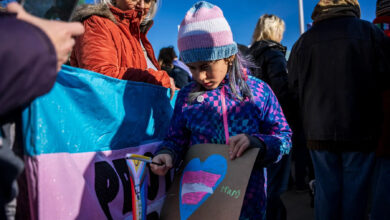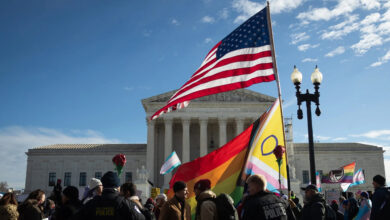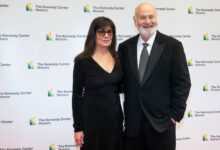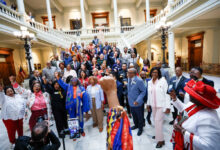Jury Caught up in Circumstances of Gay Teen Death
By GREG RISLING
LOS ANGELES – There was no question Brandon McInerney shot a gay middle school classmate in a computer lab, but deciding what crime he committed proved impossible for a jury inundated with factors to consider.
The 15-year-old victim, Larry King, had been bullied and taunted for being gay. He had recently begun wearing makeup and high heels to school and flirting with his tormentors as a defense mechanism.
McInerney, 14 at the time, was beaten by his father and was described as a bright student who lost his motivation. His defense team said the teen snapped after King sexually harassed him.
Prosecutors said the shooting in front of stunned classmates was first-degree murder and that McInerney should be punished as an adult. Defense attorneys, who unsuccessfully argued to keep the case in juvenile court, said it was voluntary manslaughter because he lost control of his emotions.
The jury was unable to reach a unanimous decision by Friday, forcing a judge to declare a mistrial. One juror, who spoke with The Associated Press but declined to be identified, said he and several jurors noted McInerney’s age and that they felt McInerney shouldn’t have been tried as an adult.
Some legal observers say while most people approve of stiff penalties for minors who commit violent crimes, they aren’t as inclined to support a lifelong prison sentence if they find out the child was abused or had other problems growing up.
“I think it’s about what the just punishment is,” said Aaron Kupchik, a sociology professor at the University of Delaware, of the deadlocked jury. “They still look at someone who was barely 14 when he did this. Though he may deserve a harsh punishment, it would be senseless to treat this child if he was as fully blameworthy as an adult.”
The case drew worldwide attention because of its shocking premise: McInerney, in a fit of homophobic rage, killed King at E.O. Green Junior High School in Oxnard because he was offended by King’s dress and how the victim dealt with him. Comic Ellen DeGeneres, who is a lesbian, weighed in on her talk show shortly after the shooting and said gays shouldn’t be treated as second-class citizens.
Prosecutors argued McInerney’s attorneys used a “gay panic” defense where he was driven to violence by King’s unwanted advances.
Jurors were apparently torn over how severe McInerney’s sentence should be. The nine-woman, three-man panel said they took a series of votes- the last one with seven in favor of voluntary manslaughter and five jurors supporting either first-degree or second-degree murder.
A first-degree murder conviction carries a maximum sentence of more than 50 years in prison, while voluntary manslaughter has a 21-year maximum prison term. To find McInerney guilty of voluntary manslaughter, jurors had to find him not guilty of first- and second-degree murder.
Defense attorneys do not deny McInerney killed King, but lawyer Scott Wippert said jurors had told him they weren’t convinced by prosecutors’ assertions the killing was a hate crime.
Prosecutors said Friday that they planned to ask Ventura County Superior Court Judge Charles Campbell for a new trial during a hearing scheduled for Oct. 5.
Over the next month, prosecutors will decide whether to pursue the same set of charges or drop some of them, said James Ellison, the chief assistant district attorney.
“We don’t know at this point if we will modify the charges,” Ellison said. “The jury’s inability to reach a verdict in this case will be a factor. We’ll consider everything.”
An option could be punting the case back to juvenile court if prosecutors are willing to drop the special allegation of lying in wait, which could carry a more severe penalty. If convicted in juvenile court of murder, McInerney would likely be released no later than his 25th birthday. He’s now 17.
Prosecutors also could offer McInerney another plea deal. His attorneys have previously passed on an agreement that would have sent McInerney to prison for 25 years to life. Defense lawyer Robyn Bramson said they wouldn’t consider a plea deal that had an indeterminate sentence.
“We want a date certain that he can look at a calendar and say, `On this date, I am going to get out,”‘ Bramson said.
The district attorney’s office was criticized in a report last month released by the Center on Juvenile and Criminal Justice that showed cases involving youths under the age of 15 are nearly 14 times more likely to be tried in adult court than anywhere else in California.
Ellison said his department was looking into the claims made in the report.










